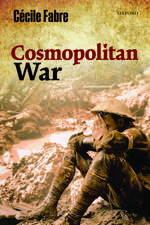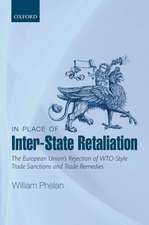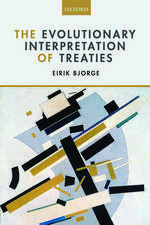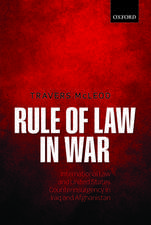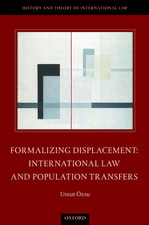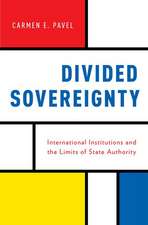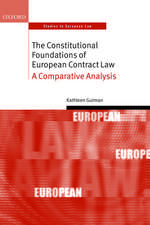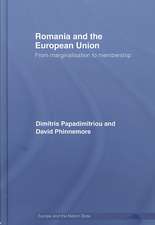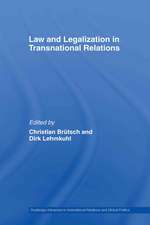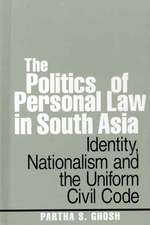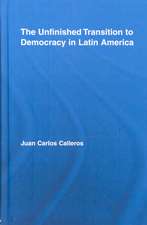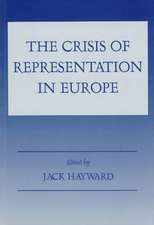The European Union's Foreign Policy in Comparative Perspective: Beyond the “Actorness and Power” Debate: Routledge/UACES Contemporary European Studies
Editat de Ingo Petersen Limba Engleză Paperback – 13 iul 2017
- What is the EU’s foreign policy quality in terms of ‘actorness’ and ‘power’ compared to other types of actors in international relations and global politics?
- What factors influence the EU’s foreign policy performance in comparison to states and international organizations?
This book will be of key interest to students and scholars of European Union studies, European Union foreign policy studies, international relations, and security policy studies.
| Toate formatele și edițiile | Preț | Express |
|---|---|---|
| Paperback (1) | 449.41 lei 6-8 săpt. | |
| Taylor & Francis – 13 iul 2017 | 449.41 lei 6-8 săpt. | |
| Hardback (1) | 1060.11 lei 6-8 săpt. | |
| Taylor & Francis – 24 noi 2015 | 1060.11 lei 6-8 săpt. |
Din seria Routledge/UACES Contemporary European Studies
-
 Preț: 312.34 lei
Preț: 312.34 lei -
 Preț: 348.15 lei
Preț: 348.15 lei -
 Preț: 310.84 lei
Preț: 310.84 lei - 9%
 Preț: 1005.57 lei
Preț: 1005.57 lei -
 Preț: 393.09 lei
Preț: 393.09 lei -
 Preț: 325.38 lei
Preț: 325.38 lei -
 Preț: 287.68 lei
Preț: 287.68 lei - 18%
 Preț: 945.80 lei
Preț: 945.80 lei -
 Preț: 275.30 lei
Preț: 275.30 lei -
 Preț: 284.52 lei
Preț: 284.52 lei -
 Preț: 464.54 lei
Preț: 464.54 lei -
 Preț: 464.54 lei
Preț: 464.54 lei - 18%
 Preț: 1057.75 lei
Preț: 1057.75 lei - 18%
 Preț: 1055.51 lei
Preț: 1055.51 lei - 18%
 Preț: 703.79 lei
Preț: 703.79 lei - 34%
 Preț: 822.34 lei
Preț: 822.34 lei - 15%
 Preț: 66.82 lei
Preț: 66.82 lei -
 Preț: 413.33 lei
Preț: 413.33 lei -
 Preț: 284.52 lei
Preț: 284.52 lei - 18%
 Preț: 1000.27 lei
Preț: 1000.27 lei - 18%
 Preț: 699.96 lei
Preț: 699.96 lei -
 Preț: 391.57 lei
Preț: 391.57 lei -
 Preț: 460.69 lei
Preț: 460.69 lei - 18%
 Preț: 1065.06 lei
Preț: 1065.06 lei -
 Preț: 464.54 lei
Preț: 464.54 lei -
 Preț: 315.29 lei
Preț: 315.29 lei - 18%
 Preț: 1054.71 lei
Preț: 1054.71 lei -
 Preț: 483.49 lei
Preț: 483.49 lei -
 Preț: 411.64 lei
Preț: 411.64 lei - 12%
 Preț: 312.43 lei
Preț: 312.43 lei - 26%
 Preț: 850.59 lei
Preț: 850.59 lei - 18%
 Preț: 1060.11 lei
Preț: 1060.11 lei - 15%
 Preț: 701.45 lei
Preț: 701.45 lei -
 Preț: 440.21 lei
Preț: 440.21 lei -
 Preț: 386.51 lei
Preț: 386.51 lei -
 Preț: 462.60 lei
Preț: 462.60 lei
Preț: 449.41 lei
Nou
Puncte Express: 674
Preț estimativ în valută:
85.99€ • 89.78$ • 71.17£
85.99€ • 89.78$ • 71.17£
Carte tipărită la comandă
Livrare economică 05-19 aprilie
Preluare comenzi: 021 569.72.76
Specificații
ISBN-13: 9781138309920
ISBN-10: 1138309923
Pagini: 306
Ilustrații: 8
Dimensiuni: 156 x 234 x 17 mm
Greutate: 0.45 kg
Ediția:1
Editura: Taylor & Francis
Colecția Routledge
Seria Routledge/UACES Contemporary European Studies
Locul publicării:Oxford, United Kingdom
ISBN-10: 1138309923
Pagini: 306
Ilustrații: 8
Dimensiuni: 156 x 234 x 17 mm
Greutate: 0.45 kg
Ediția:1
Editura: Taylor & Francis
Colecția Routledge
Seria Routledge/UACES Contemporary European Studies
Locul publicării:Oxford, United Kingdom
Public țintă
PostgraduateCuprins
Introduction: The European Union’s Foreign Policy ‘Actorness and Power’: Foundations of and Challenges for a Comparative Research Design Ingo Peters Part 1 Foreign Economic Policy 2 IMF Reform Negotiations in the G20: Comparing Actorness and Power in the Foreign Financial Policies of the EU, the US and ASEAN Steffen Murau and Kilian Spandler 3 The EU in Global Chemicals Governance Katja Biedenkopf 4 The External Reach of the EU Regulatory State: Norway, Russia and the Security of Natural Gas Supplies Nick Sitter and Svein S. Andersen Part 2 Common Foreign and Security Policy/ Peace- and State-building 5 The European Union and the Balkan Wars:
Zivilmacht Europa and the "Problem from Hell" Adrian G. V. Hyde-Price 6 EU Performance As A Regional Security Actor: Comparing ENP South to NATO’s MENA Policy Pernille Rieker 7 The EU and the US Reactions to the Arab Spring 2011: (New) Response to a Changing Middle East and North Africa Assem Dandashly Part 3 Crisis Management, Missions and Operations 8 State-Building and Police Reform in Afghanistan:EU and US Engagement in Comparative Perspective Dinoj Kumar Upadhyay and Maria Pawelec 9 The European Union’s Foreign Policy in Comparative Perspective: The EU and the US in the Sahel Ronja Kempin, Ronja Scheler, and Stefan Steinicke 10 Building a Comprehensive Approach "Bottom Up": A Systematic Comparison of the EU’s, the US’ and NATO’s Strategies for Providing Security to the Horn of Africa Bjørn Olav Knutsen and Eirik Dønjar 11 The European Union, the United Nations and the United States Missions and Operations in the Democratic Republic of Congo in Comparative Perspective Ingo Peters and Madina Diallo Conclusions: Actorness and Power of the European Union in Comparative Perspective Ingo Peters
Zivilmacht Europa and the "Problem from Hell" Adrian G. V. Hyde-Price 6 EU Performance As A Regional Security Actor: Comparing ENP South to NATO’s MENA Policy Pernille Rieker 7 The EU and the US Reactions to the Arab Spring 2011: (New) Response to a Changing Middle East and North Africa Assem Dandashly Part 3 Crisis Management, Missions and Operations 8 State-Building and Police Reform in Afghanistan:EU and US Engagement in Comparative Perspective Dinoj Kumar Upadhyay and Maria Pawelec 9 The European Union’s Foreign Policy in Comparative Perspective: The EU and the US in the Sahel Ronja Kempin, Ronja Scheler, and Stefan Steinicke 10 Building a Comprehensive Approach "Bottom Up": A Systematic Comparison of the EU’s, the US’ and NATO’s Strategies for Providing Security to the Horn of Africa Bjørn Olav Knutsen and Eirik Dønjar 11 The European Union, the United Nations and the United States Missions and Operations in the Democratic Republic of Congo in Comparative Perspective Ingo Peters and Madina Diallo Conclusions: Actorness and Power of the European Union in Comparative Perspective Ingo Peters
Notă biografică
Ingo Peters is Associate Professor of Political Science at the Freie Universität Berlin and Executive Director of the Center for Transnational Relations, Foreign and Security Policy, Germany.
Recenzii
‘This welcomed volume contains a systematic, comprehensive and well-argued comparative analysis of a highly topical issue in EU studies, at the same time providing a welcomed antidote to current pessimism regarding the EU's role in world politics.’ – Emeritus Senior Professor Walter Carlsnaes, Uppsala University, Sweden.
‘The edited book gently chips away the theory beyond merely looking at the power and actorness debates to reveal how the EU actually performs across a range of foreign policy issues by taking a comparative perspective that allows one to analyse between the declatory and operational European Union. Taking a case study approach across the three dimensions of governance/regulatory frameworks; peace and state building and crisis management and missions, it makes for compelling reading as it offers an insightful audit as it unpacks the foreign policy performance of the EU by drawing attention to challenges for collective action framed between normative discourses and interest articulation. It is informative and relevant for the practitioner and the researcher.’ - Professor Ummu Salma Bava, Centre for European Studies, Jawaharlal Nehru University, India.
'Overall, this book is interesting for both those who seek a comparative analysis of the EU’s foreign policy and those who pursue more detailed research on the EU’s role, power and infl uence in international affairs.' - Manrico De Vincentis, The International Spectator, 2016
‘The edited book gently chips away the theory beyond merely looking at the power and actorness debates to reveal how the EU actually performs across a range of foreign policy issues by taking a comparative perspective that allows one to analyse between the declatory and operational European Union. Taking a case study approach across the three dimensions of governance/regulatory frameworks; peace and state building and crisis management and missions, it makes for compelling reading as it offers an insightful audit as it unpacks the foreign policy performance of the EU by drawing attention to challenges for collective action framed between normative discourses and interest articulation. It is informative and relevant for the practitioner and the researcher.’ - Professor Ummu Salma Bava, Centre for European Studies, Jawaharlal Nehru University, India.
'Overall, this book is interesting for both those who seek a comparative analysis of the EU’s foreign policy and those who pursue more detailed research on the EU’s role, power and infl uence in international affairs.' - Manrico De Vincentis, The International Spectator, 2016
Descriere
This ground-breaking volume provides a new perspective on the EU’s foreign policy and offers a reconstruction of EU research that extends beyond narrow-minded concepts of ‘power’ and ‘actorness’. Focusing on two intertwined research questions, it presents a more sustainable base for studying EU foreign policy:
- What is the EU’s foreign policy quality in terms of ‘actorness’ and ‘power’ compared to other types of actors in international relations and global politics?
- What factors influence the EU’s foreign policy performance in comparison to states and international organizations?

